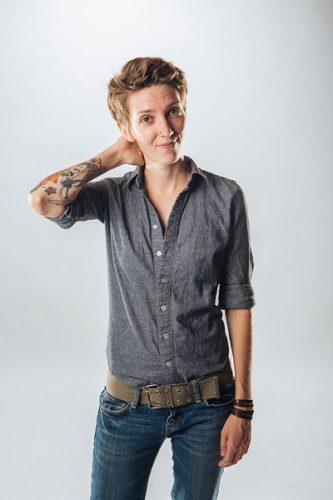
On the morning of Friday, June 26, my girlfriend coaxed me awake, smiling, eager for me to hear the decision from SCOTUS that state-level bans on same-sex marriage were declared unconstitutional. In our groggy relief, we held each other quietly, then got ready for the day.
It was hot — three-digits hot — and we were on our way to a friend’s wedding rehearsal dinner. Our phones buzzed with texts and updates. My ex-husband called, excitedly asking me if I heard the news.
It was a day of unadulterated positivity and a rainbow-ed Facebook.
My internal celebration was quiet but shot through with emotion, a feeling of reprieve and maybe some sense of closure. Retrospectively, my demure response to SCOTUS was a preemptive bracing for the forthcoming media shitstorm, which seemed inevitable.
The week following the decision proved to be a week of fear-mongering — bigotry meekly disguised as persecution of religious rights — as well as a week of a national media too attentive to politicians like Ted Cruz. Crying and angry, I said to my girlfriend: “We did win, right?”
Maybe I’m too sensitive. But maybe as a predetermined subject of a heated “issue” I am owed my sensitivities.
Humans — Americans especially — worship at the altar of certainty, the known thing. We are cultural and political cartographers, incredulous about all things until we feel we are inundated with sufficient data to progress. But when does our need for knowing become an inability to accept the strange (or stranger)?
I don’t mean to be fully damning: Our curiosities and longing for knowledge serve us again and again. But often we find ourselves in service to certitude.
When I arrived in Eugene four years ago, I left behind a conservative Midwest city nestled close to one of the Great Lakes. For me, replanting in Pacific Northwest soil allowed the opportunity to renovate and expand my understanding of self. Not because Oregon runs blue, and Eugene a deep blue, but because for centuries vagabonds, hopefuls and wanderlusts looked for fuller lives by descending into the Willamette Valley. Many Eugeneans are transplants, weirdos, rejects and misfits ad infinitum, looking not for assimilation so much as as the freedom to just be. Be: that conundrum of a word shirking away from definitives.
So amidst the saturating media coverage and political semantics, as well as the personal versus political, what’s actually next for LGBTQ equality?
I think the answer to that is less certain than we may desire. The answer includes a full embrace of otherness, within the queer community and out.
The only thing we can know fully is our experience of self (and even that is an interminable kind of knowing). Everything else hinges on trust. When your daughter tells you she’s gay, that it’s been painful to come out, fraught with doubt and confusion, you trust this, no? It’s not your experience, but you invite her in and trust her words as truth.
Of course you do. We all should. Her world is strange to you only because it’s not your own, which is never reason to estrange, and which calls for caution (i.e., thoughtfulness, intentionality) when seeking to better understand.
When asked to face the other (that is, those outside our class, race, sexual orientation, gender, etc.), we balk — not out of malice but discomfort. Change hurts. Newness hurts, its contractions conflicting with our instinct for stability.
We are a culture of identity, for good and ill, for progress but also segregation. The queer community finds itself at an odd, tense and charged crossroads. So much of our gain in equality stems from the power of identity. Identity explained, nuanced, solidified, made known. We should respect this and respectively move forward into a justice marked by embrace of the other without condition.
Lest I’ve made it seem the road forth is only theoretical and without tangibles, here are some suggestions for forward travels toward fuller LGBTQ equality: Let’s allocate our efforts on trans rights; let’s really, actually embrace fluidity in all its extrapolations; let’s examine our own language, especially when we call queerness an “issue.”
Finally, when in doubt, let’s always question our own privilege and its manifestations.
Critic and theorist Maggie Nelson argues that “it’s the binary of normative/transgressive that’s unsustainable, along with the demand that anyone live a life that’s all one thing.” I think she’s right. We (as in, Americans) have been setting up and reinforcing this dichotomy for too long.
I’m a gay woman but was once married to a man. Michael and I spent five years together, slowly and thoughtfully building a union. Then we reversed the direction, quietly loosening the seams of our home. Each pull, each act of removal was tender, honoring and full of ache.
We bought new pans together for his new apartment. We told our families. We unraveled.
I blamed myself for not knowing myself better. At 25, I thought, and felt it right, to marry Michael. At 25, I didn’t know I was gay. Even retrospectively, it’s hard to articulate where this knowledge about myself was located. Definitives were elusive.
But there was also hope in all the angst. Michael and I suspected we’d not only survive the grief, but would thrive in what would become the more honest, congruent narrative of our relationship. Paradoxically, it was the love Michael and I have for each other that eased us through divorce and supported me while I came out. It wasn’t absolutes or certainties; it was trust in the unknown thing, faith in love.
If humans long for stability, as we always will, then let us long for the kind of stability found not in environment, structure, institution or rule. But let us long for our certainty of love, to love in the face of pain and change.